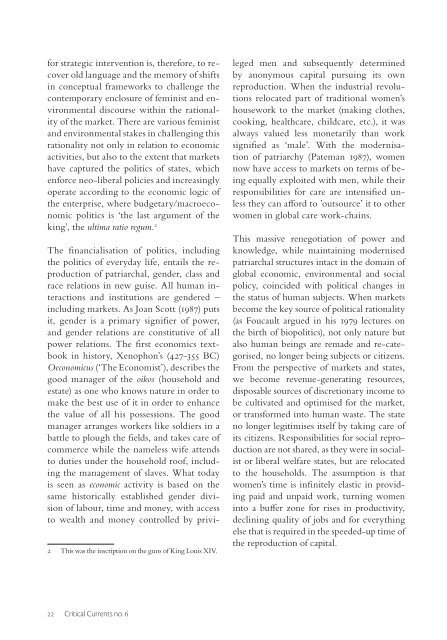Contours of Climate Justice - Dag Hammarskjöld Foundation
Contours of Climate Justice - Dag Hammarskjöld Foundation
Contours of Climate Justice - Dag Hammarskjöld Foundation
Create successful ePaper yourself
Turn your PDF publications into a flip-book with our unique Google optimized e-Paper software.
for strategic intervention is, therefore, to recover<br />
old language and the memory <strong>of</strong> shifts<br />
in conceptual frameworks to challenge the<br />
contemporary enclosure <strong>of</strong> feminist and environmental<br />
discourse within the rationality<br />
<strong>of</strong> the market. There are various feminist<br />
and environmental stakes in challenging this<br />
rationality not only in relation to economic<br />
activities, but also to the extent that markets<br />
have captured the politics <strong>of</strong> states, which<br />
enforce neo-liberal policies and increasingly<br />
operate according to the economic logic <strong>of</strong><br />
the enterprise, where budgetary/macroeconomic<br />
politics is ‘the last argument <strong>of</strong> the<br />
king’, the ultima ratio regum. 2<br />
The fi nancialisation <strong>of</strong> politics, including<br />
the politics <strong>of</strong> everyday life, entails the reproduction<br />
<strong>of</strong> patriarchal, gender, class and<br />
race relations in new guise. All human interactions<br />
and institutions are gendered –<br />
including markets. As Joan Scott (1987) puts<br />
it, gender is a primary signifi er <strong>of</strong> power,<br />
and gender relations are constitutive <strong>of</strong> all<br />
power relations. The fi rst economics textbook<br />
in history, Xenophon’s (427-355 BC)<br />
Oeconomicus (‘The Economist’), describes the<br />
good manager <strong>of</strong> the oikos (household and<br />
estate) as one who knows nature in order to<br />
make the best use <strong>of</strong> it in order to enhance<br />
the value <strong>of</strong> all his possessions. The good<br />
manager arranges workers like soldiers in a<br />
battle to plough the fi elds, and takes care <strong>of</strong><br />
commerce while the nameless wife attends<br />
to duties under the household ro<strong>of</strong>, including<br />
the management <strong>of</strong> slaves. What today<br />
is seen as economic activity is based on the<br />
same historically established gender division<br />
<strong>of</strong> labour, time and money, with access<br />
to wealth and money controlled by privi-<br />
2 This was the inscription on the guns <strong>of</strong> King Louis XIV.<br />
22 Critical Currents no. 6<br />
leged men and subsequently determined<br />
by anonymous capital pursuing its own<br />
reproduction. When the industrial revolutions<br />
relocated part <strong>of</strong> traditional women’s<br />
housework to the market (making clothes,<br />
cooking, healthcare, childcare, etc.), it was<br />
always valued less monetarily than work<br />
signifi ed as ‘male’. With the modernisation<br />
<strong>of</strong> patriarchy (Pateman 1987), women<br />
now have access to markets on terms <strong>of</strong> being<br />
equally exploited with men, while their<br />
responsibilities for care are intensifi ed unless<br />
they can aff ord to ’outsource’ it to other<br />
women in global care work-chains.<br />
This massive renegotiation <strong>of</strong> power and<br />
knowledge, while maintaining modernised<br />
patriarchal structures intact in the domain <strong>of</strong><br />
global economic, environmental and social<br />
policy, coincided with political changes in<br />
the status <strong>of</strong> human subjects. When markets<br />
become the key source <strong>of</strong> political rationality<br />
(as Foucault argued in his 1979 lectures on<br />
the birth <strong>of</strong> biopolitics), not only nature but<br />
also human beings are remade and re-categorised,<br />
no longer being subjects or citizens.<br />
From the perspective <strong>of</strong> markets and states,<br />
we become revenue-generating resources,<br />
disposable sources <strong>of</strong> discretionary income to<br />
be cultivated and optimised for the market,<br />
or transformed into human waste. The state<br />
no longer legitimises itself by taking care <strong>of</strong><br />
its citizens. Responsibilities for social reproduction<br />
are not shared, as they were in socialist<br />
or liberal welfare states, but are relocated<br />
to the households. The assumption is that<br />
women’s time is infi nitely elastic in providing<br />
paid and unpaid work, turning women<br />
into a buff er zone for rises in productivity,<br />
declining quality <strong>of</strong> jobs and for everything<br />
else that is required in the speeded-up time <strong>of</strong><br />
the reproduction <strong>of</strong> capital.
















